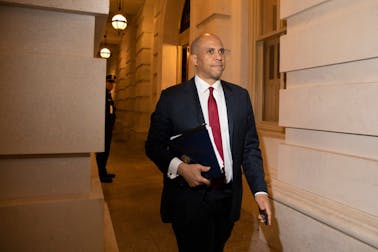I will probably be in school until 2028.
I am only 19 now, but after these last two years of my undergraduate program and four years of medical school, I will be 25.
I will not even make a full physician’s salary until I complete residency, at which point I will be closer to 29. That leaves me 38 years to work until I’m eligible to collect Social Security retirement benefits.
However, there is no guarantee that I will be alive tomorrow, or that Washington D.C. will not be wiped out in a nuclear blast, taking the U.S. Treasury with it.
With that in mind, I like to think I can make better decisions for myself than some arbitrary force controlled by elitists on the Eastern seaboard.
My previous column established how Social Security could be put on solid footing. Now, what could be done to give people more control over how Social Security is invested, and when they get paid?
The first step would be partial marketization. That means investing part of the Social Security Trust Fund in stocks rather than government bonds, exposing the system to the forces of the market.

The government could use at least 15%, but probably no more than 40%, of the Social Security Trust Fund to create special bank accounts for recipients to invest as they see fit in their retirement. This is a reasonable amount of risk, as even a low-risk investment portfolio for a private retirement account is made up of 15-40% stocks, which are considered the riskiest class of assets.
Social Security, as it currently stands, is sort of like an I.O.U. to the government that is not supposed to lose value, like a regular government bond can. The problem is that they aren’t really backed by anything tangible, since the size and demographics of the population vary greatly. There is never any guarantee that there will be enough young people working to pay for current retirees without a reduction in benefits. Especially with so many Baby Boomers set to retire in the near future.
When more bonds are purchased, whether by a large number of people or the U.S. Treasury, the interest rate, or return on the investment, decreases. Thus, they lose value.
It isn’t a great deal, certainly not for a young person to be forced to make.
The more people that invest in a stock, on the other hand, the more valuable it becomes, because that money can be directly invested by a company into some project that will make the company more valuable, and thus the stock more valuable. The increase in capital can be used to increase production or productivity.
However, no matter how much money we pour into the Federal Government, they never seem to become more productive, and never invest our money into anything profitable.
As a side note, actually lifting people out of poverty is profitable because it means more future taxpayers and less welfare recipients. The problem is, many government welfare policies ignore this and are simply content with making poverty less miserable.
Turning Social Security from an entitlement to an investment would increase the buffer against the ebb and sway of our population, grow our economy, lift more people out of poverty, and make the system more sustainable as a whole.
One criticism of this proposal is that the vast majority of Americans do not understand the specifics of investing and are more likely to waste their money on stocks that do not perform well.
Ultimately, however, this failure can be tied to the public school system for a lack of any consistent focus on finances or entrepreneurship. This is intentional, and rooted in racism, with the aim to create a “nation of workers” rather than a “nation of thinkers.”
Clearly there was and still is not any consistent aim to teach minority and low-income students, or any students for that matter, how to “lift themselves up by their bootstraps.”

We should change that. I’ve previously proposed school choice from elementary to higher education as a solution to encourage schools to better address these issues while giving students better educational opportunities.
Others might suggest the government could simply invest on behalf of recipients.
However, this invites corruption by elected officials trading on the stock market and large corporations that would likely lobby to receive these benefits.
Instead, the government could give consumers a choice amongst several soundly-operated mutual funds, in which professional money managers invest in stocks as they see fit. Consumers could then simply compare the return value and risk level of each fund. They could also be given the choice to simply invest all of their money in the traditional Social Security program.
Or, to maintain the progressive benefit structure of the program, any returns on stock market investments could be pooled into the Trust Fund and distributed at a higher rate to those with a lower income. However, this might be better as a secondary program involving only a portion of one’s benefits; that way, there is still an incentive to invest well. This secondary program could also be used to provide a guaranteed minimum return.
Giving at least some power to the consumer ensures that they are able to choose based on the investment options that would benefit them the most.
Once the Trust Fund is on solid ground, the surplus could start being saved for the next generation’s retirement and for potential market pitfalls, since inflation, government policies and international conflict can make things unpredictable. Although these pitfalls could still simply be transferred to the next generation, who would have more time to make up for lost stock values.

The surplus could also be invested in baby bonds, or some other modification to better fit the needs of individual recipients.
While Social Security has been relatively successful in combating poverty among the elderly, it might be a better investment to give people the choice to set themselves up for a successful adult life and retirement, especially considering the long-term ill effects of childhood poverty and existing wage and life-span disparities.
Baby bonds would do just that. Essentially, they would involve handing out “retirement benefits” in a lump sum upon reaching adulthood. These could then be used for specific purposes, such as obtaining college debt-free, purchasing a home, or obtaining funds to start a business.
Such a program avoids the usual criticism that debt-free college is unfair to those who choose not to go to college, as it provides alternative pathways to receive benefits.
A disproportionate number of Black students are also financially independent, meaning that many must also balance a full time job if they choose to attend college, which has led to lower enrollment and completion rates.
Those that do go to college and graduate are more likely to have come from wealthier backgrounds.
Unlike President Biden’s retroactive debt transfer entitlement, baby bonds would address this by ensuring students are not obligated to work full-time while enrolled, and would encourage more low-income and minority students to attend higher-quality schools with more options for higher-paying majors.
Students would also be able to hold these institutions accountable if they decide to simply raise tuition, since they would be able to use the baby bond dollars funding these schools for other purposes. This is the same logic behind the modern school choice movement.
And lawmakers could adjust the program as needed to concentrate benefits in the hands of those most in need.
It is about opportunity, and freedom. It is important to emphasize both when approaching economic issues.
hile the government has an obligation to invest in the next generation to ensure that everyone has an opportunity to succeed, the next generation deserves a voice in how that investment is used.
Jacob Stewart is a junior majoring in neuroscience at IUPUI and the campus editor of The Campus Citizen. He has a strong interest in policy and economics, in addition to science and education.





